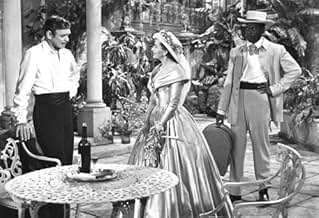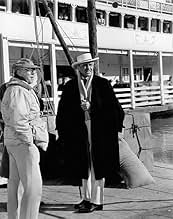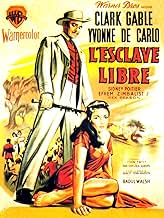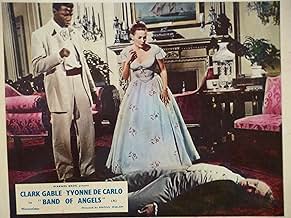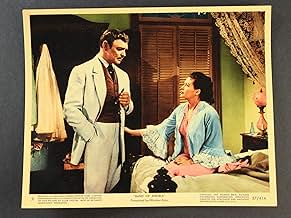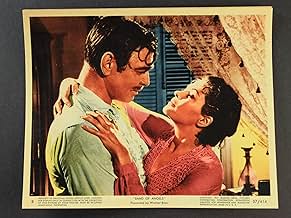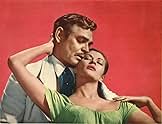अमान्था स्टार गृह युद्ध के पूर्व के दक्षिण क्षेत्र में ख़ास सुख सविधाओं से पली बढ़ी थी, लेकिन जब अपने पिता की दीवालिया मृत्यु के बाद उसे पता चला कि उसकी माँ एक अश्वेत महिला थी उसकी दुनिया बि... सभी पढ़ेंअमान्था स्टार गृह युद्ध के पूर्व के दक्षिण क्षेत्र में ख़ास सुख सविधाओं से पली बढ़ी थी, लेकिन जब अपने पिता की दीवालिया मृत्यु के बाद उसे पता चला कि उसकी माँ एक अश्वेत महिला थी उसकी दुनिया बिखर गई.अमान्था स्टार गृह युद्ध के पूर्व के दक्षिण क्षेत्र में ख़ास सुख सविधाओं से पली बढ़ी थी, लेकिन जब अपने पिता की दीवालिया मृत्यु के बाद उसे पता चला कि उसकी माँ एक अश्वेत महिला थी उसकी दुनिया बिखर गई.
- Jimmee
- (as Russ Evans)
- Gillespie
- (बिना क्रेडिट के)
- Auction Guest
- (बिना क्रेडिट के)
- Auctioneer
- (बिना क्रेडिट के)
- Maj. Gen. Benjamin Butler
- (बिना क्रेडिट के)
फ़ीचर्ड समीक्षाएं
That now out of the way, there's more at work that to my mind saves this movie. Supported by Sidney Poitier and Efrem Zimbalist Jr., Clark Gable and Yvonne deCarlo play the lead pair, who openly 'live in sin' and are otherwise reprehensible. All the same, both are portrayed sympathetically. Set in the 'Gone with the Wind' period, Gable plays an ex-slaver and cotton-grower who once prowled his plantation's slave shacks for his jollies. She is the shameful issue of a liaison with a slave on another plantation, and it's even suggested that she fools around on Gable while he's away on business.
This movie's clearly no gem, but it's no dreck. However maudlin and overdone, its basic theme of the redemptive power of love is fairly well handled. The era and settings are unusual and atmospheric enough to hold the viewer's interest, and I had no difficulty with plot over-entanglements even if my credulity was strained now and then.
It may well have been Yvonne De Carlo's best film, and Gable also did a fair job with an okay script (something not unusual while the studios struggled to survive). Sidney Poitier has a small but meaty role as an educated slave with a deep grudge. Efrem Zimbalist Jr. got his first speaking part in this film, and acquits himself smoothly with limited material. Max Steiner grinds out a spotty sountrack that's effective only in the chase scenes, and then only just ...yet a Rozsa or Korngold he never was.
The Warnercolour's glorious, and the art direction is especially fine, with atmospheric scenes especially in the Gable character's New Orleans pied-a-terre and (less so) in his plantation mansion. Mind you, it's all 100% 1950s Hollywood, and very pristine and polished ...but let's not expect too much from the era, when Edith Head primped up the women and the idea of onscreen grime, sweat or facial stubble as far off as spaghetti westerns.
A fairly good film from the 50s, in short: its eventful, sometimes quirky plot, more than passable acting and some unusual settings make most of it very watchable.
"Band of Angels" is a romantic epic that seems to be a soap opera with a story with many twists. The plot seems to be a melodramatic version of "Gone with the Wind" and Rau-Ru first attitude is ungrateful. The best moment of this melodrama is when Amantha discovers that she is considered a black woman and consequently a slave. Her situation is impressive and heartbreaking. The spoiled woman is suddenly transformed into a property of despicable men. My vote is seven.
Title (Brazil): "Meu Pecado Foi Nascer" ("My Sin Was to be Born")
One of his new charities is Yvonne DeCarlo who received one rude shock when her father died. Her mom was black, one of the plantation slaves and she is technically one also. She's not the mistress of her father's plantation, she along with the rest of the property, real and human, is to be sold for back taxes.
Gable buys her and sets her up in his New Orleans home. Also in that house is a young black man named Ra-Ru played by Sidney Poitier. Poitier, in violation of the laws of the time, has been educated. And he's acquired enough education to appreciate the situation he's in. He's got a great hate for his benefactor who he really sees as no different than other, crueler slave holders.
Today's audience which has seen Steven Spielberg's great true film Amistad about the illegal African slave trade, can appreciate far better Gable's dilemma. It's as if the owners of the Amistad grew a conscience. Gable's description of life in the slave trade when he levels with Yvonne DeCarlo is a high point of the film as is his description of the rescue of an African baby who grew up to be Sidney Poitier.
The film does borrow liberally from Gone With the Wind in terms of Gable's character. But it also borrows from Birth of a Nation. Catch the scenes at his plantation on the delta when his slaves greet him and DeCarlo coming off the riverboat. Very much in keeping with that flawed classic. Had Gable done this film at his former studio MGM, I'm sure Ava Gardner would have been cast opposite him. Though DeCarlo is fine, Ava would have made the part a classic.
Actually it's Poitier who walks off with the acting honors here. His Ra-Ru is filled with fire and passion. What Gable thought of as an act of kindness, is not perceived by Poitier as that. He's educated enough to see exactly the institution of slavery for the dehumanizing force that it is. His confrontation with another plantation owner, Patric Knowles, when he tries to force himself on DeCarlo is not something one with the slave mentality would do. Knowles makes a big mistake in assuming Poitier thinks that way.
Actually Patric Knowles has another important scene with Gable after Poitier assaults Knowles and escapes. Gable has no use for him at all. He's originally from New England and doesn't like southern aristocrats as a group. Though Knowles is reputed to be a dead shot as a duelist, Gable faces him down and makes him turn tail in my favorite scene in the film.
Band of Angels did not get the best of reviews at the time it came out. I think it was ahead of its time and can be better appreciated by audiences today.
क्या आपको पता है
- ट्रिवियाThe film proved to be a complete failure on release, both critically and commercially. Clark Gable was annoyed by the comparisons with गॉन विथ द विंड (1939) and instructed his agent, "If it doesn't suit an old geezer with false teeth, forget about it." He also decided to part company with Raoul Walsh, previously one of his favorite directors.
- गूफ़At 40 minutes, the heroine takes off her stockings, which were not yet available in those days.
- भाव
Amantha Starr: You say you won't touch me. You give me your *word* as a gentleman. Well, what's to stop you from breakin' your word late one night and forcin' yourself on me while I sleep?
Hamish Bond: [grins] Only the word of a gentleman.
Amantha Starr: [late that night, unable to sleep] He said he wouldn't. But those are his footsteps, coming down the hall. Coming closer!
[listens tensely]
Amantha Starr: He didn't! Not tonight, anyway. Why not?
[Frowning at first, she thinks it over, then gradually falls asleep]
- कनेक्शनEdited into La classe américaine (1993)
- साउंडट्रैकBand of Angels
Music by Max Steiner
Lyrics by Carl Sigman
Sung by Sarah Vaughan
Arranged by Murray Cutter (uncredited)
टॉप पसंद
- How long is Band of Angels?Alexa द्वारा संचालित
विवरण
- रिलीज़ की तारीख़
- कंट्री ऑफ़ ओरिजिन
- भाषाएं
- इस रूप में भी जाना जाता है
- Andjeoski venac
- फ़िल्माने की जगहें
- उत्पादन कंपनी
- IMDbPro पर और कंपनी क्रेडिट देखें
बॉक्स ऑफ़िस
- दुनिया भर में सकल
- $315
- चलने की अवधि2 घंटे 5 मिनट
- पक्ष अनुपात
- 1.85 : 1
इस पेज में योगदान दें



